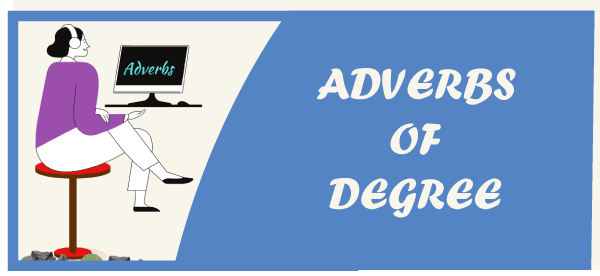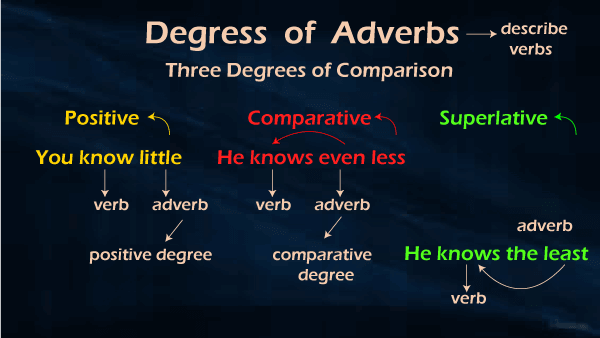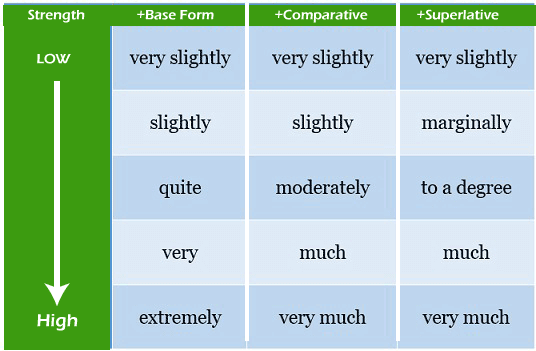Adverb of DegreeAdverbs are commonly used in English for describing the verb, adjective, or adverb in a statement. Among the numerous sorts of adverbs, a degree adverb assists speakers in expressing the intensity of something in a statement. This article discusses the meaning, definition, and usage of degree adverbs. Adverb examples are also provided for your convenience. What are Adverbs of Degree?Degree adverbs describes the magnitude or intensity of something. While there are rare exceptions, adverb of degree is normally put preceding the adjective, adverb, or verb that they change. Adverb of degree include the phrases "too," "enough," "very," and "very." 
Degree adverbs allow us to convey "how much" (or "to what extent") we accomplish something. They can either strengthen the meaning (I'm terribly hungry) or weaken it (I'm fairly positive I shut the door). Degree adverbs encompass: very, slightly, quietly, completely, fairly, utterly, and excessively. Adverb of Degree Definition By DictionariesAdverbs of Degree has been defined by renowned dictionaries;
Overview of Adverbs of DegreeRead on to learn about degree adverbs and a list of examples, and how to use degree adverbs in phrases. Thus, adverbs of a degree change a statement to indicate the degree of intensity about something. They are generally put prior the adjectives, adverbs, or verbs they change, although there are few exceptions. Adverb of degree enable you to be highly detailed in your writing, regardless of the aim. For clarity, the adverb of degree have been italicized in the examples given.
We employ degree adverbs to define what we're saying. One may tell a buddy that we are pleased, but we might just want to specify the degree (or level) of our joy: "I'm really pleased," "I'm fairly pleased," or "I'm not very glad." Adverb of degree are classified into mainly 2 types: adverb that increase the degree of something and adverb that decrease the degree of something. Words like very, fully, completely, and absolutely are examples of adverbs that strengthen or amplify the meaning. For instance: I am totally convinced Suraj will leave his duty. Words like fairly, very, slightly, and a bit are examples of adverbs that reduce or lessen the degree of expression or meaning. For instance: I'm fairly sure it'll snow tomorrow. Adverb of degree can be - extremely, quietly, just, almost, very, too, and enough. Whereas modifying can be an adjective verb or adverb. Degree adverbs can change the adjectives, another adverb, or the verbs. 
Consider the following instances: Adverb of degree have been highlighted for ease of recognition.
How Do We Use Adverbs of Degree?1. "An Adverb of Degree can show up preceding the form of the verb, following such a verb, or immediately after the element if it appears in the sentence." Examples: The instructor disapproves completely with the new guidelines of the college.
2. "Adverbs of Degree can be utilized to tailor verbs by making them greater or poorer." For instance
3. "Degree Adverbs are frequently used before action words." Examples: They almost took the trophy. 4 "In some cases, Adverbs of Degree are used to improve phrases and relative clauses." Example:
5. "Adverbs of Degree are often utilized prior to adjectives or other adverbs to alter or change them." For instance example: Bhutan is rather a pleasant location for vacation. Degree adverbs can alter adjectives or adverbsSubject + main verb + degree adverb + adjective. For example, Helen is very delighted Subject + main verb + degree adverb + adverb. For example, Tim moves very slowly. Adverb of degree can also change verbs: Subject + degree adverb + main verb, for example, The men thoroughly enjoyed their journey to the movie house. Based on the meaning, the adverbs of degree may occur just preceding the modal verb or precede the primary verb with modal verb. Let us have a look at a few examples of adverb of degree: Subject + degree adverb + modal + main verb, for example, You really should see where you are heading! Subject + modal + degree adverb + main verb. For example, They should really read the details first. When using auxiliary verb ( example, have and is/are), the adverbs are frequently placed before the primary or the main verb. As an example: Subject + auxiliary verb + degree adverb + past participle. For example, They have really liked playing at this playground. List Of Adverbs of DegreeThere are numerous adverbs of degree. However, here is the list of common Adverbs of Degree
Examples of Adverbs of DegreeBelow are the examples of adverbs of degree in sentences. The adverbs of degree have been highlighted for ease of recognition
Types Of Adverbs Of DegreeAs previously said, we may divide degree adverbs into two categories: adverbs that intensify or strengthen the word (e.g., very) and adverbs that diminish the meaning, commonly known as 'downtoners' (e.g., slightly). 
1. Weakening the significance- in adverb of degreeThere are occasions when we wish to be explicit about how we use an adjective or adverb in English. For example, we might want to indicate how anxious or cold we are. This is more precise than simply saying I'm nervous or cold. This list's adverbs are all treated in a similar way. The adverb is placed prior the adjectives or the adverbs. The adverbs a bit, rather, pretty, very, rather, somewhat, and somewhat all weaken the adjective or adverb and come before an adverb or adjective in the phrase. In general English(usually while speaking), we frequently employ the adverb 'pretty,' which has a alike meaning to 'fairly.' It has no- relation or no association with appearance or beauty. For instance, "I'm pretty excellent at football" simply means "I'm quite great at sports." or, to put it another way, I'm not bad at volleyball (warning: this might occasionally mean 'very excellent at'!). 2. Intensifying the significance (gradable adjectives) - in adverb of degreeNumerous adverbs amplify or strengthen the meaning. We must divide these adverbs into two categories for grammatical reasons. The adverb we use is determined by the fact that the adjectives (that the adverb is amplifying) is gradable or it is ungradable. For example, 'hot' is a gradable adjective, although 'boiling' is not. So in usage it can be said: It is extremely hot and totally boiling, but we can never say It is extremely boiling. The examples below provide additional instances of gradable and ungradable adjectives and the intensifiers that can be used with them. Intensifier + gradable adjective Intensifier + ungradable adjective
The group's adverbs are often placed before the adjective (which they magnify/intensify). For instance: George is extremely clever. Adverbs that can be utilized as intensifiers with ungradable adjectives include awfully, excessively, greatly, flawlessly, remarkably, and miserably. These adverbs can be utilized to alter other adverbs. For instance: Kate climbed the hill incredibly quickly. 3. Intensifying the significance (ungradable adjectives)- in adverb of degreeAdverbs that amplify an ungradable adjective are placed in the same location as the rest of the adverbs in this category. They are almost always used prior to the adjective. It should be noted that this category of adverbs does not alter other adverbs. For Instance: Johnny was totally tired. The adverbs absolutely, fully, entirely, totally, and utterly are intensifiers which can be utilized with an ungradable adjective. Adverb of degree alter adverbs and adjectives in terms as to how powerfully they modify them. 4. Adverbs that behave differently- in adverb of degreeSome degree adverbs do not cleanly fall into the three classes listed above. The instances below demonstrate the placement and use of various adverbs. A lot has a common theme to 'very much. It is employed to change verbs. For example, I like playing volleyball a lot. Although too can be employed as an intensifier, it also has a negative connotation. It implies more than is accepted or required.' For instance: That charges too much. Enough comes after an adjective or adverb rather than before it. It implies 'to the degree or the extent that is required.' For instance: Are you comfortable enough? By employing 'not,' we can alter the meaning of several adverbs. For instance: I am not delighted with the new regulations. I am sorry, but I'm not quite prepared. However, not cannot be employed with all degree adverbs! The following adverbs are frequently used with not: entirely, quite, dreadfully, totally, extremely, and particularly. 5. Collocations in adverb of degreeAnother consideration when deciding which adverb to employ is that "some adverbs work better with certain adjectives than others." In other terms, certain adverb and adjective are often used together in English, whereas others simply don't sound right.' Adverbs that are commonly used collocate nicely. Most adjectives, for instance, collocate with the word very: very large, very needy, and very lovely. 
Several adverbs do not have synonyms for every adjective or adverb. It is conceivable to be 'highly smart,' but not 'highly witty!' The following are some instances of common collocations using degree adverbs: highly smart; perfectly well; pretty good; terribly challenging. 6. Adverbial inversion in adverb of degree with negative adverbsGenerally, the subject is placed prior to the verb; nevertheless, few negative adverbs may create an inversion whenever one puts them at the beginning of a clause. The order has been flipped, with the verb coming prior to the subject. This inversion is only and solely utilized in writing; it is never used in communication or while conversing. 
Normal word order - I've never witnessed such bravery. Inversion: Never have I witnessed such bravery. Normal word order- Helen rarely left the hall Inversion- Rarely did Helen leave the hall. Adverb with negative connotations, like dreadfully and awfully, can be utilized with either positive or negative adjective. For instance, something can be 'awfully hilarious' or 'awfully sad'. Very should not be used to emphasize a verb. You should instead use the adverb, really. It is incorrect to say: I very liked it, though it is correct to say: I really liked it. The exception to the principle = I very much enjoyed it. This has the alike meaning as 'really' but is more official. ConclusionThus, Adverbs are words from parts speech that offer additional information that assists us categorize an adjective, verb, or another adverb in the sentence more precisely. These terms are divided into numerous components, each with its own unique feature. While some try to indicate how frequently an act happens, others try to express the scope of an activity. Adverbs that perform this last function are known as degree adverbs. Adverbs of degree, in a nutshell, are adverbs that help us express the power or degree of our actions. They tell us at what level or the extent to which action is taking place. A degree adverb modifies a sentence to indicate the intensity of something. They are usually put preceding the adjective, adverb, or verb that they change, but there are also some exceptions. Adverbs of degree enable you to be highly detailed in your writing, regardless of the purpose. This concludes our lesson on adverb of degree. Though these can be tricky and challenging to learn, practicing these daily can make them easy to grasp and use. So keep practicing to get hold of these.
Next TopicAdverb of Time
|
 For Videos Join Our Youtube Channel: Join Now
For Videos Join Our Youtube Channel: Join Now
Feedback
- Send your Feedback to [email protected]
Help Others, Please Share









